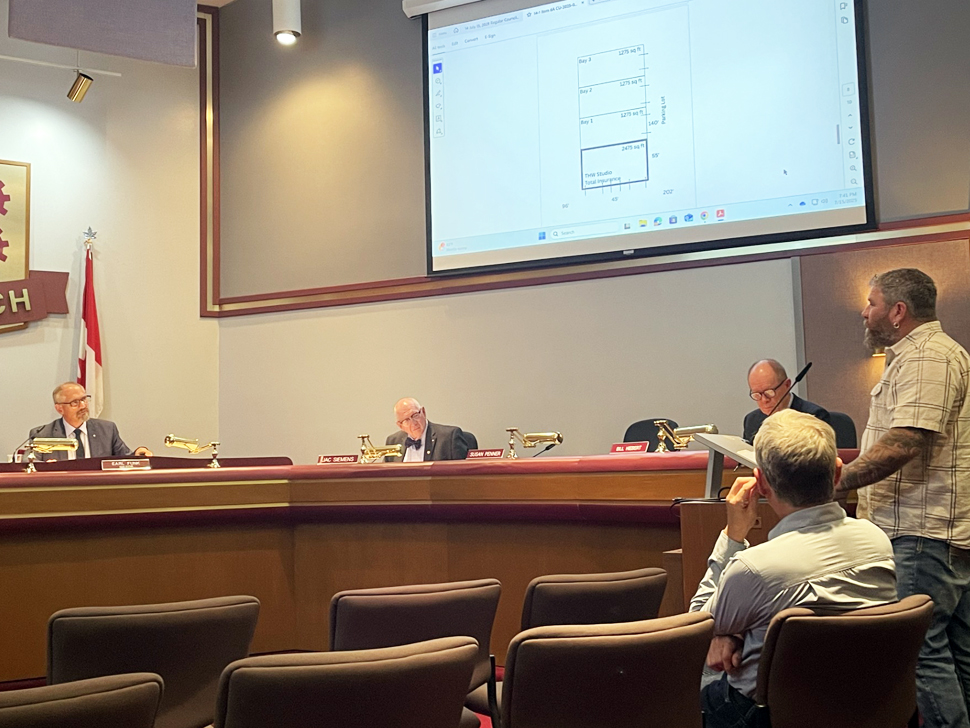A request to allow retail sales in Steinbach’s industrial park has been denied by city council following a lengthy public hearing Tuesday night.
The conditional use application from The Home Workshop Inc. aimed to establish a design studio and furniture showroom at 123 Industrial Road. Council heard that while much of the business would focus on home renovation consultations, roughly half of the proposed studio space—around 1,400 square feet—would be used for retail displays accessible to the public.
Though Councillor Jac Siemens made a motion to approve the application with strict conditions, it failed to receive a seconder. A subsequent motion to deny the application was made by Deputy Mayor Michael Zwaagstra and seconded by Councillor Damian Penner, passing with support from a majority of council.
Retail deemed not incidental
Zwaagstra acknowledged that council reviews each conditional use on a case-by-case basis, but emphasized that the city's light industrial zoning was created to attract manufacturing businesses—not retail.
“Retail is a conditional use for a reason,” he said. “When you have to put that many conditions on it to make it fit, maybe it’s because it’s not an ideal use of this particular land.”
He noted that more than half of the applicant’s design studio space would be dedicated to retail, and pointed out there would be no manufacturing on-site. Zwaagstra argued the proposal went beyond what could be considered incidental retail, and approving it could weaken the city’s ability to protect its industrial zones for future manufacturing growth.
“We want to see more retail in Steinbach—but we want to see it in our commercial zones,” he said.
Councillors raise concerns about precedent and zoning integrity
Councillor Jake Hiebert echoed his long-standing opposition to placing retail in industrial zones.
“I probably sound like a broken record,” he said, “but I don’t like the misuse of industrial property. Until we change the zoning, I’ll maintain my position against it.”
Councillor Bill Hiebert added that approving the application would create a problematic precedent.
“We had a similar situation like this before,” he said, referring to a past application that was denied. “If we approve this one, that would look really bad.”
Siemens supported the application with conditions limiting retail use to a specific unit and requiring a development agreement, while acknowledging the administrative burden such conditions would place on city staff.
Mayor Funk: Let’s keep retail in commercial zones
Mayor Earl Funk voted in favour of denying the application.
“These lots were developed to inspire manufacturing,” he said. “This one is primarily retail, and I don’t see manufacturing coming out of it.”
Funk said he sympathized with the business owner’s goal to invest in property instead of renting space, but stressed the importance of maintaining zoning integrity. He pointed to other recent situations where retail was allowed with the expectation of manufacturing—but that never materialized.
“I don’t want to see that happen again,” Funk said.
Background on the application
The Home Workshop currently operates a storefront in Steinbach’s commercial area and was seeking to relocate to a newly constructed four-unit building in the industrial park. While the business planned to use one unit for its design studio and limited retail space, the other three units would be leased out—potentially for trades or storage tenants, according to the applicant.
City administration confirmed that unless the retail use was tightly restricted, future tenants could potentially operate retail businesses as well, since conditional use approvals apply to the entire property, not just a single unit.
A local resident, Gary Snyder, raised concerns during the public hearing about whether businesses were seeking industrial land simply because it’s cheaper than commercial land. Mayor Funk explained that lots in the industrial park are sold at cost—not for profit—to make it more affordable for manufacturers to invest in Steinbach.
“This isn’t subsidized,” Funk said. “It’s done to support manufacturing—because that creates jobs, products, and economic growth in our community.”
No relocation for business
When asked what impact the denial would have on the business, applicant Albert Giesbrecht said plainly: “There would be no relocation.”
Giesbrecht indicated that the company would remain in its current location and would not proceed with the move to Industrial Road without the ability to sell directly to the public.
